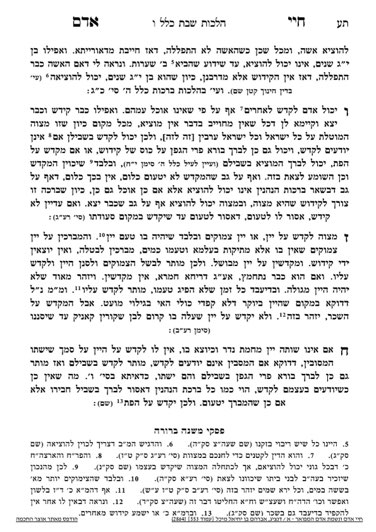The current series, which will cover Maariv on Friday night and Kiddush, is available for sponsorship. Please contact Rabbi Reingold for more information.
We are beginning siman 6. Yesterday, we learned that when one person is being motzi someone else, both individuals must have the same level of chiyuv towards that mitzvah. The way one is motzi another is based on the idea that one can share their mitzvah action with another who is listening. Hence, the one being motzi must have the same level of chiyuv because the motzi (let us call him Reuvein) is sharing the mitzvah action he is doing with the yotzei (Shimon). However, it must be a mitzvah action–if Reuvein is not chayav, whatever he is doing is not considered a mitzvah. Similarly, if Reuvein is only chayav miderabanan, and Shimon is chayav mideroaysa, Reuvein is not chayav vis a vis Shimon.
Thus, we understand why Reuvein must have a chiyuv in the mitzvah in order to be motzi others. If so, in a scenario where Reuvein is specifically not being motzi himself, such as the chaplain in a nursing home, it would seem that Reuvein cannot be motzi others.
The Gemara addresses this issue with the concept of areivus. We are guarantors for other members of Klal Yisroel. We know that there are mitzvos of tochacha (offering rebuke to a fellow Jew) exhorting others to perform mitzvos. Some suggest that these mitzvos are based on this concept. If so, even if Reuvein does not currently have a chiyuv, he has a chiyuv to make sure Shimon is yotzei, so even if Reuvein is not being yotzei at the moment, he still has a chiyuv mitzvah.
Therefore, the Chayei Adam writes that one can make kiddush for others, even if he is not eating with them, or even if he already made kiddush himself. The Chayei Adam writes that although arguably, one cannot be motzi another if they are not chayav, over here, each individual’s mitzvah of kiddush is a chiyuv upon all of Klal Yisroel, so they are all chayav. Areivus comes from the word taaruvos, which means mixture, in that we share each other’s responsibility.
Similarly, the Chayei Adam adds that one can make kiddush for someone else if they are unable or uncomfortable to make kiddush themselves.
The Gemara clarifies that the exception to the ability for areivus to be motzi another is birchos hanehenin, such as Reuvein at a meal, and wishing to be motzi Shimon in his brachos. Although we know that there are times we can be motzi another person at a meal, there are limitations. If Reuvein and Shimon are eating foods of the same bracha category, and areeat together as a kevius (i.e., seated together and eating together as one unit), Reuvein can be motzi Shimon. However, if Reuvein is not eating, or is not eating with a kevius with Shimon, he cannot just make a bracha for Shimon. The primary purpose behind birchos hanehenin is to thank Hashem for receiving benefit; if Reuvein is not receiving benefit, he cannot be motzi others. Additionally, since eating is the choice of the individual, it is not the responsibility of others. That being said, if Reuvein is eating with Shimon, he may be motzi him, as we do on Shabbos for hamotzi.
However, we gave an example of a chaplain in a nursing home. In this case, the Chaplain making kiddush is not eating, and if he were to take a little, he would have a kiddush b’makom seudah issue. If so, we need to understand why Reuvein can be motzi Shimon in kiddush.
Summary
One can be motzi another in a mitzvah, provided that both the motzi and yotzei have the same level of mitzvah obligation.
However, one can not be motzi another in birchas hanehenin, unless they are both eating and are in a state of kevius together. That will include being seated together, intending to eat together, etc.



